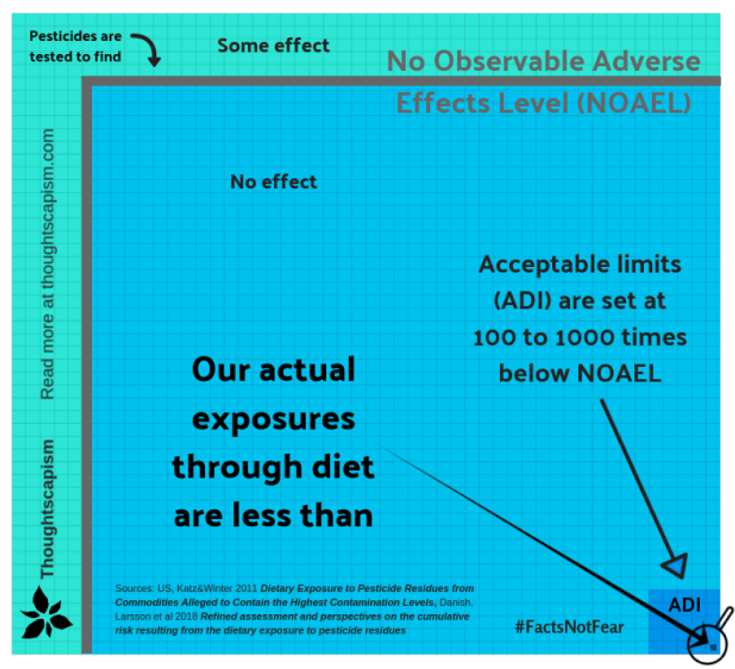The Science Behind Organic Foods
To organic or to not organic, the great nutrition question. As with all things, my intention behind this post is to inform and let you make the best decision for you. Let’s dive in.
MORE NATURAL FOODS VS THE APPEAL TO NATURE FALLACY
A common argument in favor of organic produce is that it is more “natural”.
A couple things here. First, natural does not necessarily mean safer. This is called the appeal to nature fallacy (1). There are plenty of things in nature that are unregulated and not safe, and plenty of man-made things that are rigorously tested and extremely safe.
Second, what does more “natural” even mean? Maybe that organic farming doesn’t use pesticides?
ORGANIC USES PESTICIDES TOO
Well, they do (2). While pesticide use in organic food is on average slightly lower than in conventional foods, a USDA study of 571 "organic" fruits and vegetables found 43% to have detectable residues of pesticides prohibited in organic production (3).
Furthermore, conventional pesticide levels in food is extremely low and very safe.
Pesticides are rigorously tested to find the levels at which they would present some adverse affect. Thus, you have what is called the NOAEL or no observable adverse effects level. An acceptable daily intake, or ADI, is then set at 100-1,000x below NOAEL. Then, our actual exposure is 100-1,000x lower than that. For example, you could consume over 13,225 servings of blueberries in one day without any effect even if those blueberries had the highest pesticide residue recorded for blueberries in the USA. I think you'd be far more concerned about things other than pesticides at that point. Also, 99% of the pesticides we eat are produced by plants themselves, anyways (3).
WE DO NOT HAVE ANY EVIDENCE TO SUGGEST ORGANIC IS MORE NUTRITIOUS THAN CONVENTIONAL
Some organic foods may have slightly higher micronutrient amounts than conventional foods, around 5-25% more. Vitamin C is the nutrient most commonly increased in organic foods, but it is rare to have a vitamin C deficiency in developed countries. That being said, a 2012 systematic review of 240 studies showed that "the published literature lacks strong evidence that organic foods are significantly more nutritious than conventional foods" (4).
BETTER FOR THE ENVIRONMENT?
As a final nail in the coffin, organic farming is less sustainable than conventional. It is less efficient, more costly, has lower yields. Overall, it is worse in terms of the "impact versus the amount of food produced." "To have raised all U.S. crops as organic in 2014 would have required farming of 109 million more acres of land." (3)
SUMMARY
In summary, you probably do not need to worry about purchasing organic foods. The organic label tells you nothing about a foods quality or safety; it is a fear-based marketing term. We also need to realize our food privilege in even being able to talk about these topics. Basic nutrition and accessibility to a variety of foods is most important. Consider taking any extra money you would use by purchasing organic food and donate to someone in need instead.
SOURCES:
https://fallacyinlogic.com/appeal-to-nature/
https://geneticliteracyproject.org/2021/04/12/pesticides-and-food-its-not-a-black-or-white-issue-part-6-pesticide-residues%e2%80%95something-to-worry-about/
https://www.ams.usda.gov/sites/default/files/media/Pesticide%20Residue%20Testing_Org%20Produce _2010-11PilotStudy.pdf
https://www.acpjournals.org/doi/10.7326/0003-4819-157-5-201209040-00007?url_ver=Z39.88-2003&rfr_id=ori:rid:crossref.org&rfr_dat=cr_pub%20%200pubmed
https://gmoanswers.com/gmos-in-the-us
https://gmoanswers.com/gmos-environment
https://www.ncbi.nlm.nih.gov/pmc/articles/PMC2682994/ https://gmoanswers.com/golden-rice

